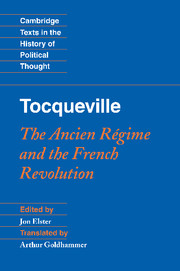Book contents
- Frontmatter
- Contents
- Introduction
- Bibliographical Note
- Chronology
- TOCQUEVILLE: THE ANCIEN RÉGIME AND THE FRENCH REVOLUTION
- Foreword
- Book I
- Book II
- II.1 Why Feudal Prerogatives Had Become More Odious to the People in France Than Anywhere Else
- II.2 Why Administrative Centralization Is an Institution of the Ancien Régime and Not, As Some Say, the Work of the Revolution or Empire
- II.3 How What Today Is Called Administrative Tutelage Is an Institution of the Ancien Régime
- II.4 How Administrative Justice and the Immunity of Public Officials Were Institutions of the Ancien Régime
- II.5 How Centralization Was Thus Able to Insinuate Itself among the Old Powers and Supplant Them Without Destroying Them
- II.6 On Administrative Mores under the Ancien Régime
- II.7 How France, of All the Countries of Europe, Was Already the One in Which the Capital Had Achieved the Greatest Preponderance over the Provinces and Most Fully Subsumed the Entire Country
- II.8 That France Was the Country Where People Had Become Most Alike
- II.9 How Men So Similar Were More Separate Than Ever, Divided into Small Groups Alien and Indifferent to One Another
- II.10 How the Destruction of Political Liberty and the Separation of Classes Caused Nearly All the Maladies That Proved Fatal to the Ancien Régime
- II.11 On the Kind of Liberty to Be Found under the Ancien Régime and Its Influence on the Revolution
- II.12 How, Despite the Progress of Civilization, the Condition of the French Peasant Was Sometimes Worse in the Eighteenth Century Than It Had Been in the Thirteenth
- Book III
- Appendix: On the Pays d'états, and in Particular Languedoc
- Notes
- Index
- CAMBRIDGE TEXTS IN THE HISTORY OF POLITICAL THOUGHT
II.9 - How Men So Similar Were More Separate Than Ever, Divided into Small Groups Alien and Indifferent to One Another
Published online by Cambridge University Press: 05 June 2012
- Frontmatter
- Contents
- Introduction
- Bibliographical Note
- Chronology
- TOCQUEVILLE: THE ANCIEN RÉGIME AND THE FRENCH REVOLUTION
- Foreword
- Book I
- Book II
- II.1 Why Feudal Prerogatives Had Become More Odious to the People in France Than Anywhere Else
- II.2 Why Administrative Centralization Is an Institution of the Ancien Régime and Not, As Some Say, the Work of the Revolution or Empire
- II.3 How What Today Is Called Administrative Tutelage Is an Institution of the Ancien Régime
- II.4 How Administrative Justice and the Immunity of Public Officials Were Institutions of the Ancien Régime
- II.5 How Centralization Was Thus Able to Insinuate Itself among the Old Powers and Supplant Them Without Destroying Them
- II.6 On Administrative Mores under the Ancien Régime
- II.7 How France, of All the Countries of Europe, Was Already the One in Which the Capital Had Achieved the Greatest Preponderance over the Provinces and Most Fully Subsumed the Entire Country
- II.8 That France Was the Country Where People Had Become Most Alike
- II.9 How Men So Similar Were More Separate Than Ever, Divided into Small Groups Alien and Indifferent to One Another
- II.10 How the Destruction of Political Liberty and the Separation of Classes Caused Nearly All the Maladies That Proved Fatal to the Ancien Régime
- II.11 On the Kind of Liberty to Be Found under the Ancien Régime and Its Influence on the Revolution
- II.12 How, Despite the Progress of Civilization, the Condition of the French Peasant Was Sometimes Worse in the Eighteenth Century Than It Had Been in the Thirteenth
- Book III
- Appendix: On the Pays d'états, and in Particular Languedoc
- Notes
- Index
- CAMBRIDGE TEXTS IN THE HISTORY OF POLITICAL THOUGHT
Summary
Let us now consider the other side of the picture and see how these same Frenchmen, who were alike in so many ways, were nevertheless more isolated from one another than people perhaps anywhere else, and more even than they had ever been previously in France.
It seems quite clear that at the time the feudal system established itself in Europe, what has since come to be called the nobility did not immediately constitute a caste; rather, it originally comprised the foremost men and women in the nation and was thus initially merely an aristocracy. This is not an issue I want to discuss here. Suffice it to say that by the Middle Ages, the nobility had become a caste, by which I mean that birth was its distinguishing characteristic.
The nobility did retain one essential characteristic of an aristocracy, that of being a body of citizens who govern, but birth alone decided those who would stand at the head of this body. Anyone who was not born noble was excluded from this closed and separate class and occupied a position in the state that could be high or low but always remained subordinate.
Wherever the feudal system became established on the European continent, it ended in caste. Only in England did it return to aristocracy.
I have always found it astonishing that a fact that sets England apart from all other modern nations, and which alone can explain the peculiarities of its laws, its spirit, and its history, has not drawn even more attention from philosophers and statesmen than it has, and I am surprised that habit has ultimately made it all but invisible to the English themselves.
- Type
- Chapter
- Information
- Tocqueville: The Ancien Régime and the French Revolution , pp. 80 - 92Publisher: Cambridge University PressPrint publication year: 2011



